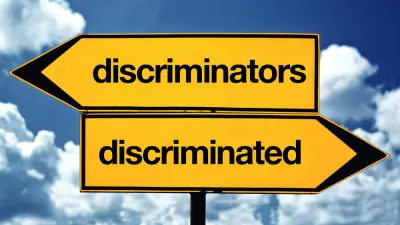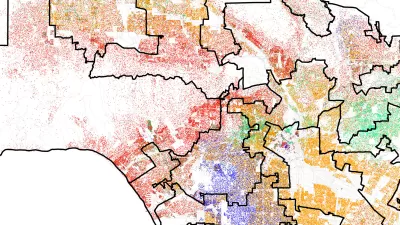A study utilizing simulations of more than 20 million virtual “neighborhoods” finds a negative relationship between cohesion and diversity. The findings could alter how we understand and build social capital within neighborhoods and across cities.
Richard Florida looks at a new study, “The (In)compatibility of Diversity and Sense of Community” [PDF], published in the November edition of the American Journal of Community Psychology that found a "troubling paradox" using agent-based modeling: "community and diversity may be fundamentally incompatible goals."
Seeking to find a silver lining to these "sobering" findings, Florida asks sociologist Zachary Neal, one of the study's authors: "If diversity is unattainable at the neighborhood level, might it be possible at the level of the city, as essentially a network of more or less similar neighborhoods?"
"We usually view segregation as problematic, but when it comes in the form of a patchwork of neighborhoods and enclaves that each have their own character, it may actually ‘work,’” says Neal.
"For this reason, urbanists and local policy makers might be better off refocusing their efforts away from the unachievable ideal of diverse and cohesive neighborhoods and toward creating cohesion across the various neighborhoods that make up a city," posits Florida.
FULL STORY: The Paradox of Diverse Communities

Alabama: Trump Terminates Settlements for Black Communities Harmed By Raw Sewage
Trump deemed the landmark civil rights agreement “illegal DEI and environmental justice policy.”

Planetizen Federal Action Tracker
A weekly monitor of how Trump’s orders and actions are impacting planners and planning in America.

The 120 Year Old Tiny Home Villages That Sheltered San Francisco’s Earthquake Refugees
More than a century ago, San Francisco mobilized to house thousands of residents displaced by the 1906 earthquake. Could their strategy offer a model for the present?

In Both Crashes and Crime, Public Transportation is Far Safer than Driving
Contrary to popular assumptions, public transportation has far lower crash and crime rates than automobile travel. For safer communities, improve and encourage transit travel.

Report: Zoning Reforms Should Complement Nashville’s Ambitious Transit Plan
Without reform, restrictive zoning codes will limit the impact of the city’s planned transit expansion and could exclude some of the residents who depend on transit the most.

Judge Orders Release of Frozen IRA, IIJA Funding
The decision is a victory for environmental groups who charged that freezing funds for critical infrastructure and disaster response programs caused “real and irreparable harm” to communities.
Urban Design for Planners 1: Software Tools
This six-course series explores essential urban design concepts using open source software and equips planners with the tools they need to participate fully in the urban design process.
Planning for Universal Design
Learn the tools for implementing Universal Design in planning regulations.
Clanton & Associates, Inc.
Jessamine County Fiscal Court
Institute for Housing and Urban Development Studies (IHS)
City of Grandview
Harvard GSD Executive Education
Toledo-Lucas County Plan Commissions
Salt Lake City
NYU Wagner Graduate School of Public Service





























